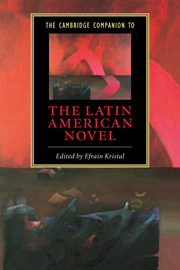3 - The Boom of the Latin American novel
from Part I - History
Published online by Cambridge University Press: 28 May 2006
Summary
Mapping the field
Beginnings are notoriously difficult to define: what we have in literature are continuities and breaks with the past. Did the “Boom” of the Latin American novel begin in 1958, when Carlos Fuentes (b. 1928) published his innovative, multilayered exploration of Mexico City in the 1940s and 1950s, La región más transparente (Where the Air is Clear)? Or in 1962, when Mario Vargas Llosa (b. 1936) won the Biblioteca Breve Prize (offered by the Spanish publishers Seix Barral) for his manuscript Los impostores (“The impostors”), that would later be re-titled La ciudad y los perros (Time of the Hero)? Or in 1963, when Julio Cortázar (1914-84) published Rayuela (Hopscotch), his extraordinary Baedeker of the new? Or in 1967, when Gabriel García Márquez (b. 1928) brought out Cien años de soledad (One Hundred Years of Solitude), initiating a worldwide interest in magical realism? Whatever inaugural date different critics might propose, this chapter deals with developments from the late fifties to the early seventies.
Two different political projects helped to modernize and radicalize the political and cultural climate: the Cuban Revolution and the rhetoric and realities of what economists at the time called “developmentalism.” We should not, with over forty years of hindsight and in a very different political climate, underestimate the achievements and also the hope offered by the Cuban Revolution. It was held by most at the time in Latin America to be an exemplary nationalist and anti-imperialist movement that seemed to demand an intellectual and practical commitment and offered the utopian promise of uniting the artistic and political vanguards.
- Type
- Chapter
- Information
- The Cambridge Companion to the Latin American Novel , pp. 59 - 80Publisher: Cambridge University PressPrint publication year: 2005
- 16
- Cited by



